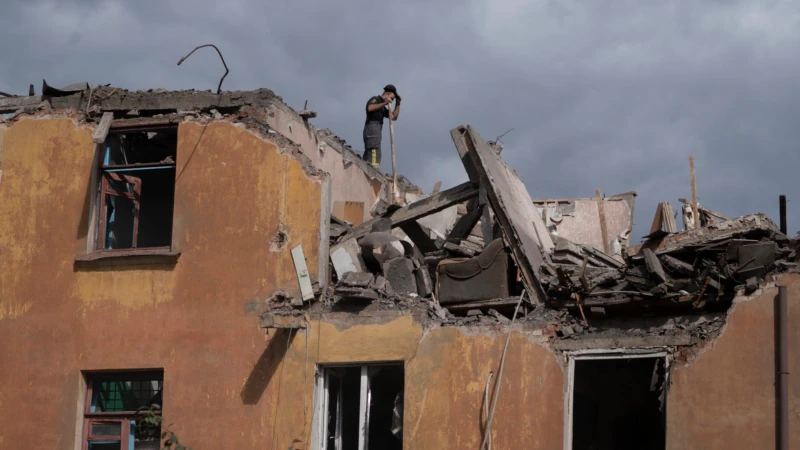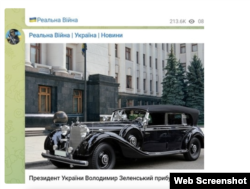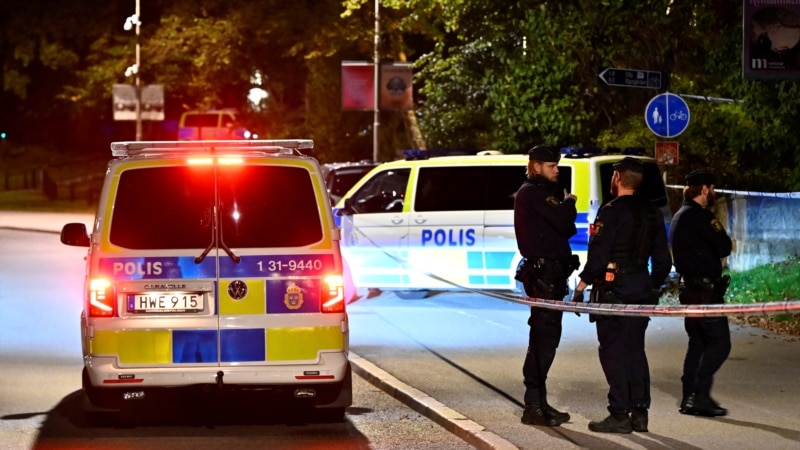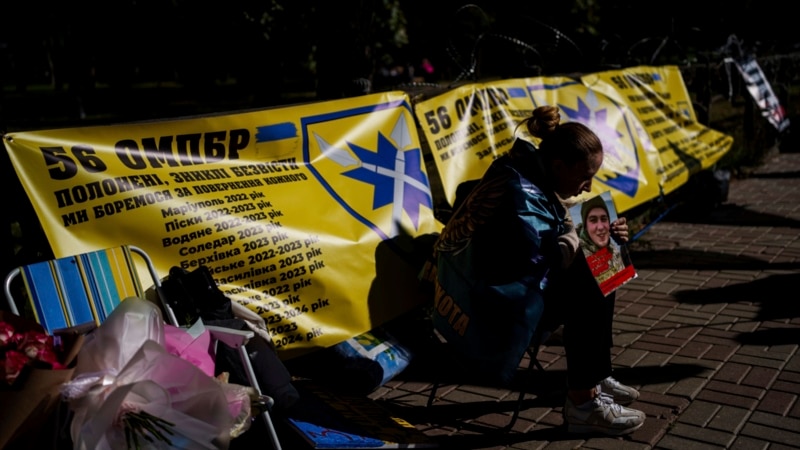For full coverage of the crisis in Ukraine, visit Flashpoint Ukraine.
The latest developments in Russia’s war on Ukraine. All times EDT.
12:30 p.m.: A new assessment from the U.S. Government Accountability Office (GAO) finds that while the Pentagon and State Department have responded swiftly to back Ukraine following Russia’s invasion, there is more work to be done. VOA National Security Correspondent Jeff Seldin reports the GAO is suggesting U.S. defense officials could take steps to better support Ukraine over the long term with better planning for the U.S. military posture in Europe.
The GAO snapshot also says the U.S. military should work on better integrating information operations. It also finds the State Department could do a better job of sharing information on democracy assistance projects in Ukraine
11:30 a.m.: U.S. Secretary of State Antony Blinken has toured a devastated section of Irpin city Thursday during his unannounced visit to Ukraine. A diplomatic reporter traveling with Blinken says his main guide was Dmytro Nehresha, deputy mayor of Irpin. The reporter says he showed Blinken a series of scorched buildings with entire floors blackened or imploded, with debris still scattered everywhere.
Many of the buildings toured needed to be demolished, the deputy mayor said. “The Russians indiscriminately shelled this city,” he said. “This was a city with so many young residents. We were looking forward to developing it.”
Blinken said he was convinced the city would bounce back. “Hearing your vision and determination I’m convinced,” he said.
10:11 a.m: The head of Ukraine’s atomic energy operator accused Russia on Thursday of trying to “steal” Europe’s largest nuclear plant by cutting it off from the Ukrainian electricity grid and leaving it on the brink of a radiation disaster, the Associated Press reported.
The Zaporizhzhia Nuclear Power Plant has been without an outside source of electricity since Monday and receives power for its own safety systems from only one of its six reactors that remains operational, Enerhoatom chief Petro Kotin told AP.
Both Moscow and Kyiv have for weeks accused each other of shelling the nuclear plant.
On Tuesday, Rafael Grossi, the head of the International Atomic Energy Agency, said the continued attacks on the Zaporizhzhia nuclear power plant are “unacceptable,” and he urged that a demilitarized area be created in and around the facility. Grossi and a team of IAEA inspectors visited the site last week.
9:30 a.m.: U.S. Secretary of State Antony Blinken has met with Ukrainian President Volodymyr Zelenskyy during his unannounced visit to Kyiv.
According to pool reports, after the men sat down, Zelenskyy said Ukraine is grateful for the “enormous support” the United States has sent Ukraine and singled out President Joe Biden and the United States Congress for praise. He said the U.S. was helping Ukraine “return our territory and lands.”
Blinken said “it’s wonderful to see you again,” and noted that this was his fifth trip to Ukraine since becoming Secretary of State. Blinken said this is a “pivotal moment” as the country’s counter-offensive against Russian forces in Southern Ukraine is underway. He said the offensive was “proving effective.
9:00 a.m. While in Kyiv Thursday, U.S. Secretary of State Antony Blinken visited a children’s hospital where he met with children being treated there, including some injured by Russian bombardments.
Since February 24, an average of five children have been killed or injured in Ukraine every day, according to a humanitarian aid organization “Save the Children” that cited verified United Nations data.
8:16 a.m.: Poland joined the Baltic states on Thursday in limiting the admission of Russian nationals on its territory, the government said, the latest move aiming to penalize Moscow for its invasion of Ukraine, according to Reuters.
Lithuania, Latvia and Estonia this week agreed to limit the entry of Russian nationals into their countries from Russia and Belarus.
“It is unacceptable that, while people in Ukraine are being tortured and murdered, citizens from the aggressor state (Russia) can travel freely within the EU,” the Polish government said in a statement, adding the new measures should enter into force by Sept. 19.
6:30 a.m.: Secretary of State Antony Blinken has traveled to Kyiv to announce $2.6 billion in security assistance for Ukraine and 18 other countries in the region “most potentially at risk for future Russian aggression. He is meeting with meeting with Ukrainian officials during the unannounced visit.
6 a.m.: Russia said on Thursday it was ordering a Romanian diplomat to leave the country in response to the expulsion of one of its diplomats from Bucharest, Reuters reported.
Romania, like other European Union member states, was designated an “unfriendly country” by Moscow after it imposed sanctions in retaliation for Russia’s war in Ukraine.
Earlier this year, Russia and EU countries expelled hundreds of each other’s diplomats in the wake of the February 24 invasion.
5:45 a.m.: Ukrainian forces in southeastern Kharkiv Oblast are likely taking advantage of the deployment of Russian forces to the south to conduct a counteroffensive northwest of Izyum, according to a U.S. think tank called the Institute for the Study of War.
5 a.m.: Hungary’s government is waiting for more details about the European Union’s proposed price cap on Russian gas as it does not fully understand the proposal yet, Prime Minister Viktor Orban’s chief of staff said on Thursday.
Gergely Gulyas also said the government would decide at its next meeting on the future of current price caps on fuel and certain foodstuffs that expire on October 1.
4:55 a.m.: U.S. President Joe Biden approved an additional $675 million weapons package for Ukraine, Defense Secretary Lloyd Austin said on Thursday, as ministers met to discuss how to give Kyiv long-term support in countering Russia’s invasion, Reuters reported.
The six-month-old conflict has killed thousands and reduced Ukrainian cities to rubble. In recent weeks, fears have grown over a potential disaster at Zaporizhzhia, Europe’s biggest nuclear power plant.
Austin, who was speaking at the start of a meeting of defense ministers at Ramstein air base in Germany, said the gathering would discuss how countries can work together to train Ukrainian forces and improve their defenses.
“This contact group needs to position itself to sustain Ukraine’s brave defenders for the long haul,” Austin said, referring to the meeting. “That means a continued and determined flow of capability now.”
The conflict has settled into a war of attrition fought primarily in eastern and southern Ukraine. The latest U.S. package will include more ammunitions, humvees and anti-tank systems.
Washington has already provided more than $10 billion in military assistance to President Volodymyr Zelenskyy’s government since Russian troops invaded Ukraine on February 24.
4:40 a.m.: The Kyiv Independent reported via Telegram that Belarus will hold military drills at the Ukraine borders.
Belarus’ Defense Ministry said its military will conduct drills in areas bordering Ukraine and Poland and as well as Belarus’ Minsk and Vitsebsk regions until September 14.
According to Deputy Chief of Ukraine’s General Staff Oleksii Hromov, the drills will allegedly focus on crossing into Ukraine and taking parts of Ukraine that Belarus considers “lost territories.”
3:20 a.m.:
3 a.m.: The commercial insurance market, Lloyd’s of London, said Thursday it has set aside $1.26 billion (1.1 billion pounds) to pay claims related to the war in Ukraine, as it recorded a first-half pre-tax loss of 1.8 billion pounds, Reuters reported.
The reserves for the Ukraine claims were net of reinsurance, Lloyd’s said in a statement. Insurers buy reinsurance to offload some of the risk of large losses.
“We’ve taken a very early view of what we think the financial implications will be,” Lloyd’s Chief Executive John Neal told Reuters by phone, adding the losses were likely to be about the same size as “a small to medium-sized natural catastrophe.”
Around a quarter of Lloyd’s’ Ukraine losses may come from the aviation market, Neal said. Aviation lessors and insurers are wrangling over planes trapped in Russia due to the invasion of Ukraine — which Russia calls a “special military operation” — and subsequent Western sanctions.
Insurers globally may face claims of around $10 billion to $15 billion from the conflict, Neal added.
2:30 a.m.: Belarus has started military exercises by the city of Brest near the Polish border, its capital Minsk and the northeast region of Vitebsk, Reuters reported on Thursday, citing the defense ministry.
It said the exercises, which are set to last until September 14, will practice “liberating territory temporarily seized by the enemy” and regaining control over border regions.
According to the ministry, the level of troops and military equipment involved in the exercise did not require them to provide notice under the Organization for Security and Co-operation in Europe, or the OSCE, guidelines.
Belarus is a key staging area for Moscow’s invasion of Ukraine, which Russia calls a “special military operation.”
1:50 a.m.: Russian President Vladimir Putin threatened to halt all energy shipments to Europe if Brussels goes ahead with a proposal to cap the price of Russian gas, in a combative speech declaring Russia would not lose the war in Ukraine, Reuters reported.
The speech came as Ukrainian President Volodymyr Zelenskyy reported “good news” from the front near Kharkiv in the east, saying some settlements had been recaptured as both sides reported heavy fighting in the region.
Ukrainian and pro-Russian officials said there was fighting around the town of Balakleiia about 60 kilometers (38 miles) southeast of Kharkiv, with unconfirmed reports of heavy losses to Russian forces. An explosion at a power plant near Odesa in the south, meanwhile, cut electricity supplies to 360,000 people, a spokesperson for the regional administration said.
Putin said in a speech on Wednesday to an economic forum in Russia’s Far East that Russia would not lose what he calls its “special military operation” in Ukraine. He threatened to halt all supplies of energy to Europe if Brussels went ahead with its proposed price cap on Russian gas, the latest Western step to deprive the Kremlin of funds to finance the war.
“We will not supply gas, oil, coal, heating oil — we will not supply anything” if that occurs, he said. Europe usually imports about 40% of its gas and 30% of its oil from Russia.
The United States and France says Moscow is already using energy as a “weapon” to weaken Europe’s opposition to its invasion, with the main conduit for Russian gas into Europe, Nord Stream 1, shut for maintenance.
1 a.m.:
12:05 a.m.: Lithuanians crowd-funded a drone for Ukraine and the country has sent a steady stream of weapons, including the latest: Howitzers.
Some information in this report came from The Associated Press, Reuters and Agence France-Presse.








